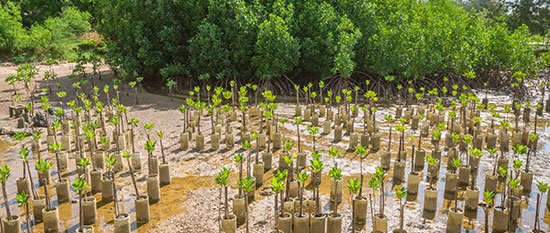Accelerating research on sustainable, equitable solutions to address the climate crisis, in keeping with the Duke Climate Commitment.
CRISP By the Numbers
Check out these totals from CRISP’s first two funding rounds, awarded in May 2023 and May 2024:
- $1.34 million awarded
- 75 Duke researchers supported
- 24 new research teams launched
- 85 proposals submitted
- 8 Duke schools represented by recipients
Forty-five Duke University scholars are pursuing new research on sustainable, equitable solutions to address climate change and its effects, supported by the second round of awards from the Duke Climate Research Innovation Seed Program (CRISP).
In May 2024, 12 teams were collectively awarded nearly $700,000 to investigate topics such as equitable disaster recovery, community insurance, financing climate-smart agriculture, water quality challenges posed by sea level rise, forest-based carbon offsets and more. Teams include experts from seven Duke schools and three interdisciplinary institutes, in addition to partners from a dozen other universities and environmental organizations.
CRISP advances research tied to the Duke Climate Commitment, which unites the university’s education, research, operations and public service missions to address climate challenges.
In the second round of funding, all Duke faculty and research staff could apply for Research Awards (up to $100,000) to support projects focused on climate and community resilience, one of four Duke Climate Commitment areas of focus. Ideation Awards (up to $20,000) were available to support work on any of the areas: climate and community resilience, energy transformation, environmental and climate justice and climate and data. The 2024 request for proposals attracted interest from across Duke. Forty-four project teams applied for a total of $2.8 million.
The second round of CRISP awards was funded by a donor’s gift to support the Duke Climate Commitment.
Second Round of CRISP Awards Announced

The 2024 CRISP awards will support 45 Duke University scholars on 12 teams to pursue new research projects advancing climate solutions. Many will focus on climate and community resilience.
Previously Funded Projects
The initial round of CRISP grants in 2023 funded 12 teams of scholars from across 8 Duke schools to investigate wide-ranging topics such as lower-cost, higher-efficiency solar cells; subsidies for energy-saving home renovations; the environmental, health and justice impacts of mining critical raw materials; and pastoral care for climate change. Awards totaling $643,000 included Research Awards (up to $100,000) focused on energy transformation and Ideation Awards (up to $20,000) spanning all four Duke Climate Commitment areas of focus.
Learn More About CRISP
The application period for 2024 CRISP proposals closed on February 26, 2024; download the RFP to learn more about the process. Duke faculty and staff can join the Nicholas Institute email list to be alerted to future funding rounds.
Questions? Contact Tom Cinq-Mars at the Nicholas Institute.

